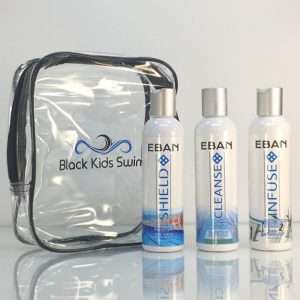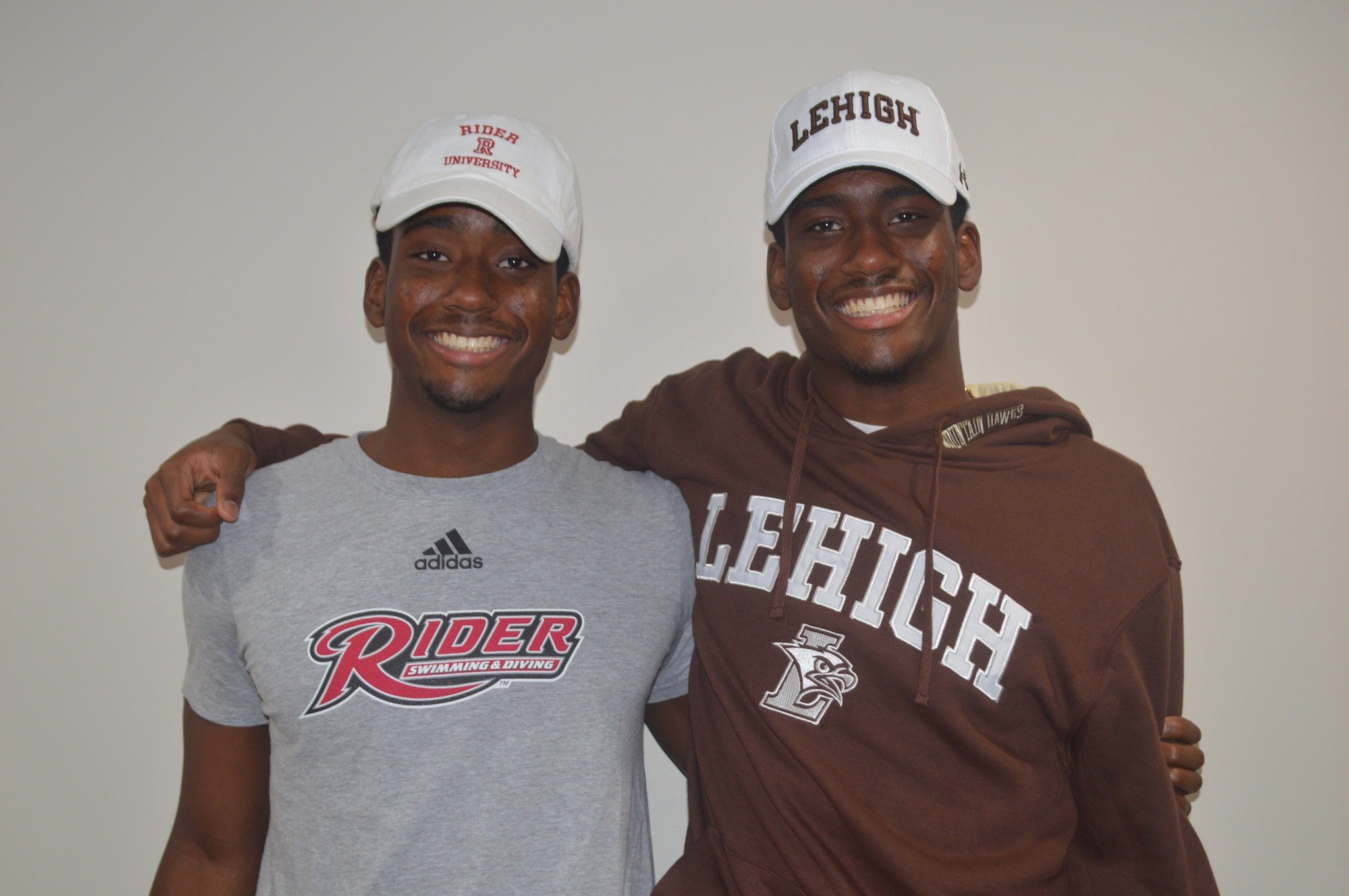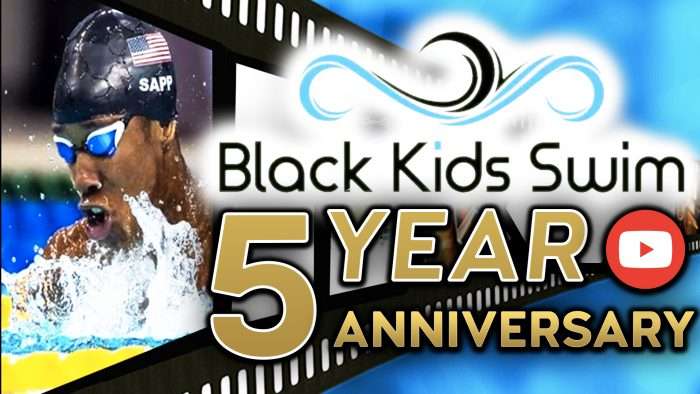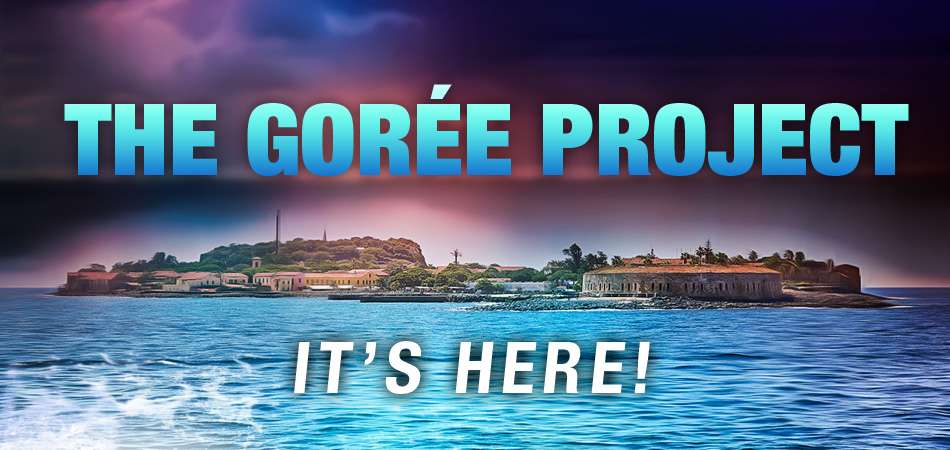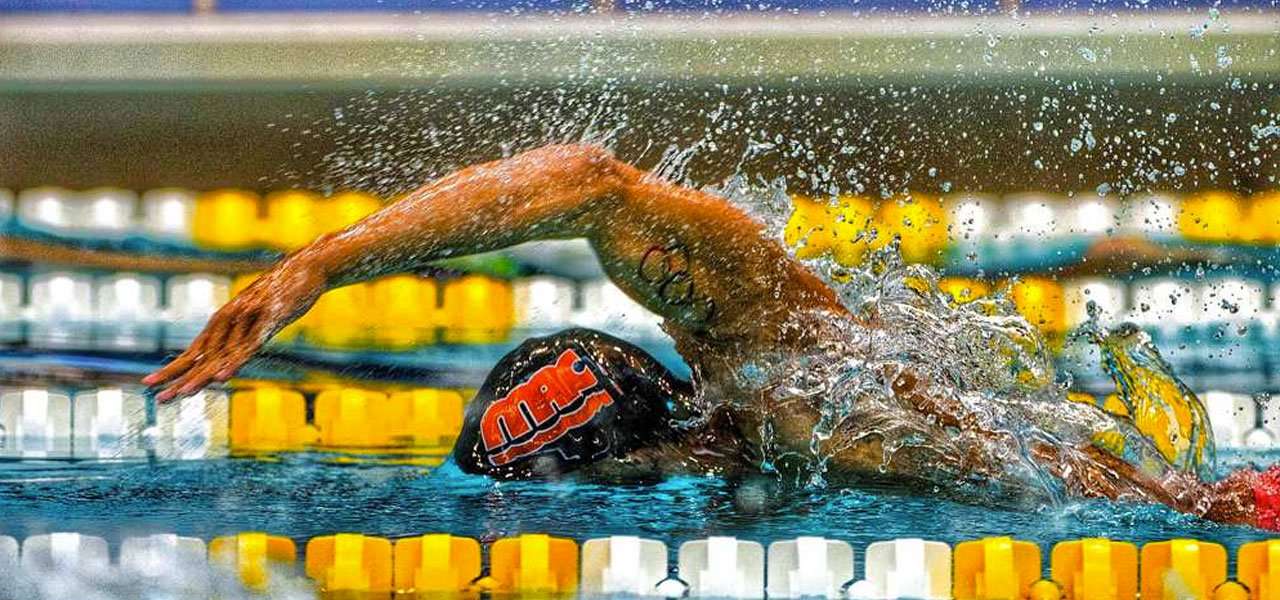
Black Olympic Swimmer Roy Burch Speaks with Black Kids Swim
Roy Allan Burch is an elite swimmer from Bermuda. He holds Bermuda national titles in the 50m free, 50m butterfly, and 100m free in both long and short course events. He has also represented Bermuda in the 2008 and 2012 Olympic games. You may have seen him on the 2015 FINIS catalogue cover or in Forbes magazine discussing his time management secrets. He’s awesome and, lately, his face seems to be everywhere. Despite a recent serious injury he is currently preparing to compete in the 50m free in the 2016 Olympics. In addition to his many accolades in swimming – he’s a popular inspirational speaker and an all around great guy. He took time out of his hectic training and public speaking schedule to talk with Black Kids Swim about his new training regimen, his work ethic, his parents, his opinion on why many African Americans can’t swim, and his hopes for Black people in the sport of competitive swimming.
Black Kids Swim: We’re huge fans! Roy, you are a true inspiration, thank you for speaking with Black Kids Swim.
Roy Burch: Of course. I definitely want to support anything that is positive for the community, especially the Black community. I’m not American but I do what I can to help the Black community around the world.
BKS: Thank you, BKS wants to see more Black kids in the water and interested in swimming competitively. We do our best to give parents the resources they need to support kids in those efforts. Most African Americans lean towards track, basketball and football so sometimes our community doesn’t know how to support a competitive swimmer.
[pullquote align=”full” class=”” link=”” color=”#066cb2″ size=”20″]I think the Black community can get a lot more out of the sport than they believe they can…No matter what is going on for Black people in this country you can still have it the way that you want it.[/pullquote]
RB: That’s important.
BKS: We want to applaud successful swimmers, like yourself. And we hope to see you compete in Rio later this year.
RB: Thank you. Thank you for the support. I’m working very hard to make that happen
BKS: After training so hard for the 2016 Olympics you suffered a serious injury in March. Your recovery has not been easy. We saw you were in a wheelchair for some time. What are you doing now in terms of your recovery and training process?
RB: I’m back to regular training. Basically, my week consists of a daily swim Monday through Saturday. I swim for 2 – 2.5 hours. Also dry land every day. Lighter weight lifting or something to help strengthen some of the muscles that were weakened after the injury. I needed more mobility with strength. My strength trainer Raphael Ruiz works with me every day in that aspect and I also do two sessions of Pilates a week in order to reinforce my connectivity and open up new space and new strength.
BKS: That sounds pretty intense for someone in recovery.
RB: Its not as vigorous as it used to be before I was injured but it’s pretty close. It’s a good program and I’m really happy with how things are moving forward after suffering the most detrimental kind of injury I’ve ever had. I’m only down about two sessions from what I used to be and so I’m pretty much back to a nice heavy training schedule directed towards my one goal of competing in the 50m free in the 2016 Olympics.
BKS: Your injury, a bi-lateral patella rupture in both knees is probably the worst injury for a swimmer. That type of injury is more commonly seen in athletes in high impact sports like football.
RB: Right, people thought I got in a car crash. so when I was in the hospital the doctors came and everybody wanted to look at me. They were trying to figure out what happened because it didn’t make any sense; how could I have this double rupture and nothing else was wrong with me? They were all used to ruptures like that with some type of high impact situation, and even then a double rupture is rare. For me to have the injury and to have it recorded on video was a very unique situation. The Charlotte Observer article includes a video of how the injury happened.
BKS: We saw the video – it was hard to watch. But thankfully, you’re recovering from that. Swimming 6 days a week, weightlifting and also dry land. What kind of dry land, specifically, are you doing?
RB: It tends to work on the muscles that, for me, have been neglected. So, the mobility wasn’t great through my T Spine (Thoracic spine or mid-back) so I had to increase my mobility and maintain my strength to be able to maintain my positioning in the water. And, so different things like just working on the small muscles in the shoulders, working on hip stability and hip strength. I work on strengthening the muscles that can be neglected when you get into a big weight program and you’re just trying to move big weights with heavy squats, power cleans and bench press. So, we put things in the workout to prevent injury and also to to gain strength in the small muscles that help stabilize the big muscles. Before, I neglected that a bit. So this is almost like preventative work. I’ve always been strong and I’ve pushed my strength really hard but I’ve never pushed the little things that you don’t really want to do but that need to be a part of the program. Swimmers overuse the shoulders and they can get burned out because we’re swimming so many laps. So, we have different exercises to maintain the safety in the shoulders. I used to get a lot of tendonitis in my elbows from lifting weights and climbing the ropes, so now I do a lot of things for grip strength. It can just be opening and closing the hand in order to work forearms in the opposite way from how they are used to being worked. So, I guess if I wanted to break it down completely it’s more like I’ve worked so hard on standing up, now I have to work on sitting back down.
[pullquote align=”full” class=”” link=”” color=”#066cb2″ size=”20″]“You’ve been told that you can’t come to the pool… In Bermuda, we’ve had access for our whole lives. So the type of experiences that Blacks had in the United States are very foreign to me.” [/pullquote]
BKS: In the United States the disheartening truth is that 70% of African Americans don’t know how to swim. Is it the same in Bermuda?
RB: No, not at all. In Bermuda everybody knows how to swim. We know how to survive in the water, even though everybody doesn’t necessarily know how to swim competitively. All my friends that I grew up with around my neighborhood – we would all go to the docks and bridges and jump off of them and swim back in to shore. And the ships would come in and drop a cart into the water and we would dive into the carts and get pulled all around the ocean. The guys I was doing this with never had a formal swim lesson. Maybe a little bit in school, but no formal training. That high percentage for African Americans in the U.S. not knowing how to swim – it’s not like that in Bermuda. It’s much lower, I would guess below 10%. Most Bermudians can swim because the water is in such close proximity. You can’t really go too far without being near the water. If you don’t know how to swim you’re really limiting your experience of the country – you’ll only be able to experience the land aspect and the widest part of the island is only 1.75 miles wide. There’s water everywhere and we all have access to water. So, that statistic for African Americans is shocking to me. I can understand why it happened though. Blacks were pushed away from pools, they weren’t allowed to be in them. So at this point it’s like why is anybody going to move towards swimming when it’s been instilled in them to stay away.
BKS: Many African Americans say that they did not learn to swim because their parents and grandparents had a fear of the water and wanted to keep them away from danger. When someone in their neighborhood or family drowned due to a lack of swimming skills it gave them a fear of the water. Did you grow up in a community that had these types of fears?
RB: Not really. Our field trips for school would be to the beach or to the water. The water in Bermuda is heavily involved in everyone’s life. So, you can’t keep someone away from that. It’s one thing if you’re removed from the water, so far inland that you can’t get to a lake or any body of water and you’ve been told that you can’t come to the pool. Then, you don’t have access. In Bermuda, we’ve had access for our whole lives. So the type of experiences that Blacks had in the United States are very foreign to me. People fear the water – but water is amazing! It’s life, there is life in it. To be in water, to experience the buoyancy, the relaxation is wonderful. It doesn’t have to always be about training, just enjoying the water is a part of life. Relaxation to me always made sense. So it never made sense to me how people could fear the water. But, if you’ve only heard stories of grief, if you’ve never seen the beauty of the water; then I can imagine it would be very difficult to get into it.
BKS: Have you thought about what you can do as an elite swimmer and role model to help change that statistic for African Americans?
RB: Yes, and a lot of people in the Charlotte NC community have reached out to me to help with breaking that down a bit. I have to do my part to change that. That is something that I want to get more into after I move on from being a competitive swimmer.
BKS: Many former competitive swimmers, like Maritza McClendon and Sabir Muhammad have started schools and programs to encourage more African Americans to learn to swim.
RB: I’ve seen Sabir swim, he was an excellent swimmer when I was younger. I remember watching him when I was in high school. He was in the New Jersey area for a meet and I remember seeing him.
BKS: There are several meets in the United States that encourage diversity in swimming particularly for African Americans. They include the Black History Invitational Swim Meet in Washington DC, the Black Heritage Swim Meet in Cary NC and the Martin Luther King Jr. Swim Invitational in Long Island, NY. Have you ever attended a swim meet with predominantly Black swimmers?
RB: When I was 9 I got to swim in my first international competition which was in New Jersey. The following year I went to my first Caribbean championship and it really blew my mind because all of the swimmers were black. The Bermuda team brought the most White swimmers. The Caribbean championships have predominantly people of color, all very good, swimming at a high level and speaking all different languages. Black people speaking Spanish and Dutch and it was just very stimulating – an amazing environment. And I just wanted to be a part of that and succeed in the water.
[pullquote align=”full” class=”” link=”” color=”#066cb2″ size=”20″]They would bring me early and allow me to stay late for those practices. They embraced my desire to keep swimming and to keep practicing. [/pullquote]
My first meet with mostly Black swimmers was in Barbados; the CISC Caribbean Island Swimming Championships and they hold that every two years. And then they have the Caribbean and Central American Swim meet. These are regional competitions for us. And Bermudians, with the exception of a few Portuguese on the Island, all speak English. I had never seen or met Black people that spoke other languages. But now that I’ve traveled more and more I’ve seen a ton of Black people who speak other languages. I’ve met Black people who speak German, they don’t speak anything else but German. I was like what, you don’t speak English? Why? It really opens you up to the real, it opens up your mind. There are more possibilities. There’s a lot out there as long as you are willing to look and explore and grow and be open to the opportunities, which I was, so recognizing my surroundings and recognizing that I had never been in surroundings like this I just wanted to continue to see more and it was amazing to experience those kind of things.
BKS: Many of our readers are parents of young swimmers. Can you share with them what your parents did to help you become an elite swimmer?
RB: My mother was the main advocate for me being a swimmer. So, it started with backyard swim lessons. By the time I was 4 years old I was able to swim much further than the rest of the kids that were learning with me so they then put me into a club situation and once I started with club swimming I just enjoyed being in the water all of the time. At the age of 10, I started swimming in higher levels of the club and I started doing 2 practices back to back. I would do my practice and then, since I was interested in what the older kids were practicing, I just stayed in the water for about 3 hours training and training. My parents were the ones carting me back and forth. They would bring me early and allow me to stay late for those practices. They embraced my desire to keep swimming and to keep practicing and that got me to a point where I was able to swim for my country in age group championships, Caribbean championships and Central American championships. My mother was very good about making sure I knew that the doors being opened for me and the opportunities made available to me were because of the work I was doing. The training was opening doors for me. Her main thing was to keep me pushing towards that and also to continue being a student. And that was hard for me- I had to work harder in the classroom than I did in the water. She really pushed me to be a student athlete so that I could make sure that the doors stayed open. I opened the doors because I was swimming but I was able to walk through the doors because I was a good student.
BKS: You attended the Peddie School for High School, where did you go to college?
RB: I spent 2 years at the Peddie School in NJ and there my career flourished. But, because I was already considered a graduate of High School when I left Bermuda, I was told that I couldn’t use my credits from the Peddie School when applying to college.The reason I went to Peddie was to raise my level of academics. But I couldn’t use any of my academic history from the Peddie School and it destroyed me. So I had to use the grades I had coming from Bermuda which weren’t very good. And they were just not up to the standard of the schools that I wanted to attend. So, I ended up not being able to swim Division 1. I had the options of going to a community college and getting an Associates degree and then transferring to a Division 1 school. Or I had the option of swimming at a Division 3 school. But, my division 3 options were limited. I only had options to go to South Dakota (and I didn’t know where south dakota was at the time), Clarion out in Pennsylvania, and Springfield college which was in Massachusetts. And I knew where that was, I had heard of Boston. And that’s basically how I made my decision. I thought ‘I know that place so I can go there, do what I gotta do.’ At the time I was in a different frame of mind. I wasn’t looking to be at a competitive level or Olympic level anymore. I just wanted to compete with my college team and do my work and just be done with the sport because of everything I was going through at the time. I was in a lot of pain mentally. It was a tough time, a tough year for me.
BKS: The year you’re speaking of is when your mother passed away during your senior year at Peddie, right?
RB: Yes, when my mom passed away when I was a senior, things got a little crazy and I had to do some soul searching to figure out what I was going to do. My swimming made her happy – to see me succeed. I got the most success in my life in the water. So, I was trying for the Olympics in 2004 but she passed in 2003. So, things didn’t go the way that I wanted them to. I had already lost my mother and now I couldn’t go to college because I couldn’t use the two years of schooling I had completed in NJ. I never realized how much she had done for me. So, when she passed I realized that all of these things that were being done that I didn’t even know about I now had to take on myself. So, those were challenging times but I found my way back around through college and I ended up swimming well through my junior and senior year. And thats when I qualified for my first Olympics
[pullquote align=”full” class=”” link=”” color=”#066cb2″ size=”20″]I was like let’s go, let’s get to work…I needed to show that I was worth working with. [/pullquote]
BKS: You’ve spoken a lot about your mother and the role she played in making you the man and the athlete you are today, what about your father?
RB: Our relationship is up and down. At the moment it’s a little down. He’s always been supportive of my swimming. He’s just a different kind of guy. He would always say that our sports kept us away from being with his side of the family. But our sports is what put my younger brother and I at the level where we are now. But my father is always very supportive. He would put money down. He would say, if I broke a certain record, he would give me money and those types of things motivated me. He realized that he shouldn’t put as much money down because I ended up taking a lot from him! So, as a preteen I would swim even harder. So, those type of stipulations worked for me at the time. And I’m not sure I would be where I am today if he hadn’t put some of those stipulations on the line. But I always want to work on that relationship because obviously he’s my father and I want to make sure that relationship is healthy. Things change and things happen and sometimes relationships struggle. He’s always been a good supporter – a hard worker – very hard worker. I feel like some of my hustle and grind comes from him pushing himself hard to make sure that we had what we needed. So I’m not mad at him at all. We just go through difficult things that need to be worked out.
BKS: Your father put down money to encourage you to beat your personal best times. And you currently are Bermuda’s national record holder in several events.
RB:Yes, 50 free, 100 free, 50 back 50 fly both short and long course.
BKS: That’s amazing, something to be extremely proud of, for your family to be proud of.
RB: Thank you
BKS: I also read in an article that you wanted to swim with SwimMAC Elite, which you eventually did. The first time that you asked to train with them the head coach, David Marsh, said that he “Only worked with medalists” I had an emotional reaction when I read that, and I wondered how you felt, how you reacted when he said that.
RB: He said “I coach medalists, that’s what I do” and at the time I was like “whoa, what do I need to get with you?” It was a little discouraging because I didn’t know what that meant, did that mean he was going to take me on or what? I just didn’t know, I was just young in the sport and the weight of what he said was a blow. So I went about working on trying to get at least to a level where he could consider my potential.
BKS: How old were you when he said that to you?
RB: I may have been 21 or 22.
BKS: How old were you when he agreed to start coaching you?
RB: 25
BKS: So it took 3 or 4 years to work down to the times when he would consider coaching you?
RB: Yes, and even when I got here it was part time, a few times a week. After the 2012 London Olympic games where I swam a 22.4 in the 50 free – that time put me more on his radar. And then they allowed me to work with them. And that was a bit of a struggle. But it didn’t matter to me. Because as long as I wasn’t in Bermuda I knew I was going to get better training than I could in bermuda. No matter what, I was getting better training. Even if it was only a few times a week with Marsh and the rest of the week was with coaches that used his methods. No matter what, that was all going to be better for me. So I just put in the work to show that I wanted to be there. I was always thankful to be there. I minimized my complaining. The only thing that bothered me was cold water. Other than that, I was like let’s go, let’s get to work. When it was time to put in work I knew that I had to push myself harder because I needed to show that I was worth working with and that I was going to be the hard worker. I was going to be the guy in the water, showing up on time, first in the water, getting out of the water late, working on extra things, working on my strength and just doing everything possible to make sure that I showed my work ethic and my effort to prove that I could bring something to this sport and that I could make a difference. And I felt like I could make a difference. No one was like me. There was going to be no other swimmer like me, no other person in this sport like me. And I wanted to show that and I think now Marsh knows that more than ever. I promote the team through social media, posting to Twitter and Facebook frequently and I’m the editor of the SwimMAC Elite Instagram account. I do as much as I can for the team so I think now having been the hard worker he’s happy that I’m a part of the organization and I’ve come to make the organization better and that was one of the most important things for him: you had to be someone who was going to make something better – make the organization and the people around you better. And if you were negative and you didn’t work hard then you were a draw on the organization, so I made sure that everything I put in was positive and helped progress the goal of becoming a real professional swimmer.
BKS: Parents can be just as competitive as the kids. They want to make sure their child is getting the best training and sometimes you see kids switching teams every year or every summer chasing what parents perceive as the best training program. What do you look for in a team or coach? What do you advise parents look for in a swim team or swim coach?
RB: Mostly look for technique and organization. What the main focus is during the workout. Is the form being taken into account? How well the swimmers are looked over is important. I haven’t looked at a lot of programs. SwimMAC is a top to bottom structure, from learn to swim all the way up to team Elite so there’s all of these levels which give the kids access to things that they wouldn’t have in other groups. So I would like to see more total programs like that. But it’s very rare. Definitely, a focus on technique and make sure the kids are using their bodies properly – not just grinding and pounding. To me that’s walking towards injury. The culture of the group should be good- everyone supporting each other. You don’t want to be in groups where people are made to feel bad about who they are. That’s not a healthy environment. You want a healthy environment that promotes a healthy lifestyle. Also maintaining good technique and form and work hard at what they do.
BKS: You’ve achieved many things through the sport of swimming, has your swimming performance resulted in any opportunities for you?
RB: I would have never thought that I would be on the 2015 front cover of my sponsor’s, FINIS, catalogue. There are things that have happened for me through this sport that I never would have imagined. But they wouldn’t have happened if I didn’t continue to push myself and if I didn’t desire more out of this sport for myself. I also have another sponsor, digital communications company Digicel Bermuda. Digicel put up posters with my picture on it throughout the country on big huge billboards and their new huge store. They are using my image, and I never would have thought that that would happen for me. Sometimes we see these people in magazines and we wonder ‘how did they get that opportunity’ I just never thought that I could get those opportunities for myself. Through continuous perseverance those things happened for me. I got injured and I’m working to get back because this type of adversity and losing my mom was the biggest adversity I’d ever dealt with and I knew if I could get through that then the sky’s the limit. I can do and live the way that I want to live happily and peacefully.
BKS: Do you have any words of encouragement for young Black swimmers who want to excel as competitive swimmers but who don’t see a lot of elite swimmers who look like them?
RB: I would encourage them to continue to work in the sport. There’s a lot of opportunities for people of color in the sport of swimming – more opportunities than they may realize. As long as you push yourself and show that you’re a hard worker and you are a productive member of the team and of the organization then more doors than you’ve ever dreamed will open. Want to be a better YOU.
It doesn’t matter what somebody else is doing or if someone else is better at the time, as long as you’re working to make yourself better every day. Because every day something can be worked on. And that’s great for your character and it’s great for life prep, there’s no other sport like swimming where you have to be in the element and looking at the bottom of the pool and you have to be so focused on what your body is doing in the element. It’s a great growth experience and I think the Black community can get a lot more out of the sport than they believe they can. In terms of the opportunities afforded to me, I’ve only scratched the surface. And for Black Americans I still think the sky is the limit. No matter what is going on for Black people in this country you can still have it the way that you want it. Many cultures have struggled, letting go of that struggle and just working on what you need to work on is more important. If you stay focused on oppression or the things that have held you down instead of thinking “what am I going to do to get up” then you’re at a loss. I just want people to focus more on what they can do to be better and be amazing. Because they can and I believe everybody can.
Roy Allan Burch continues to train with David Marsh and SwimMAC Elite in North Carolina. He has until July 2016 to qualify for Bermuda’s Olympic swim team.
Black Kids Swim will be cheering for Roy and we hope to see him compete in Rio!
Ebony is a wife and mommy of two gorgeous swimmers. She started Black Kids Swim to help parents (like herself!) who want to be supportive swim parents to African American children.

